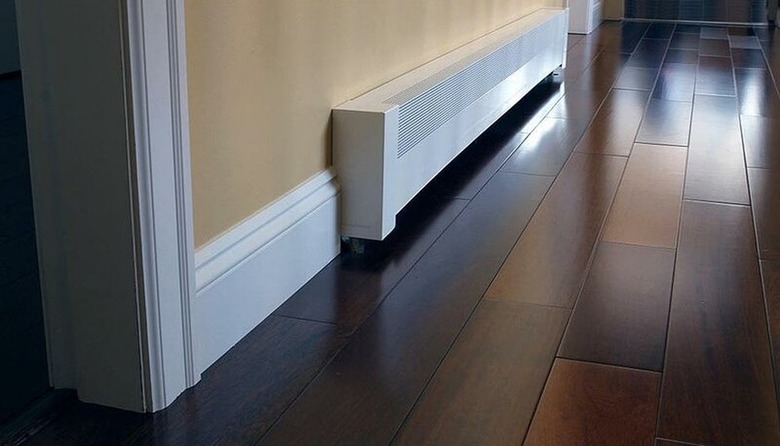My Baseboard Heater Is Leaking
We may receive a commission on purchases made from links.
Baseboard heaters can keep individual rooms toasty warm, but if your baseboard heater is leaking, you need to act fast. Not only does a leak make your heating system less efficient, but it also causes other issues in your home. It can damage your floors and cause the growth of molds and mildews in the area of the leak. Baseboard heater leaks can come from pinholes, cracks, or splits in different parts of the system.
How Baseboard Heaters Work
How Baseboard Heaters Work
You can have electric or hydronic baseboard heaters to heat individual rooms. Electric heaters use metal fins to heat the air. A hydronic baseboard heater uses heated water or another heat-transfer liquid to warm your room. Coils or rods heat the liquid in many units while some baseboard heating systems are attached to a boiler that heats the water. The water circulates within the heater, which means water shouldn't leak out of the heater unless there's an issue.
Small Baseboard Heater Leaks
Small Baseboard Heater Leaks
A small leak should be fixed, but isn't a cause for immediate concern in regards to the heating system itself. Hot water heating systems have a connection to the main water supply from the home. So, the system retains the water it needs by drawing it from the main water supply. Be sure to clean up any leaks quickly, and bleach the area if you suspect it has been damp for some time to prevent the growth of mold.
Finding Baseboard Heater Leaks
Finding Baseboard Heater Leaks
Finding the exact source of the leak is important when deciding whether the problem is repairable or if the baseboard heater unit should be replaced instead. Trace the path of the water back along the system to see if you can pinpoint the leak. Look for moisture directly on the radiator and look for cracks, pinholes, or other signs of leaking. Sometimes you might trace the leak back to a valve or elbow, in which case the piece probably needs to be replaced by a professional.
Fixing Baseboard Heater Leaks
Fixing Baseboard Heater Leaks
A leak repair on a hot water radiator is a fairly involved process, although it can be done without professional help if the leak is small. The radiator needs to be drained first, and then cleaned very thoroughly with a substance that cuts all the grease away from the surface, such as acetone. Then you file the surface to create a place a the patch will adhere to. You can use a product like J-B Weld steel-reinforced epoxy to fix small leaks in your baseboard heater.
Replacing Baseboard Heaters
Replacing Baseboard Heaters
Some leaks come from damage that is too severe to fix. Instead, you'll need to replace the baseboard heater with a new unit. This typically includes cracks or splits in the system. Pinhole leaks can usually be repaired, but once the metal has started to split it is difficult to make it strong enough again to sustain the pressure load exerted on heaters.
Another bad sign is significant rust. Even if you patch one leak in a rusty baseboard heater, it is likely to spring another in the near future and replacement is probably a better option.
